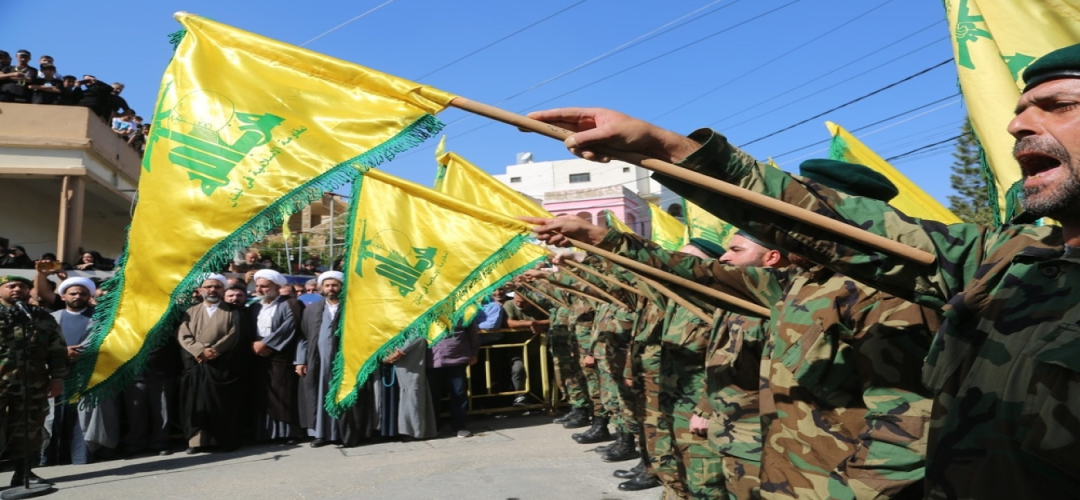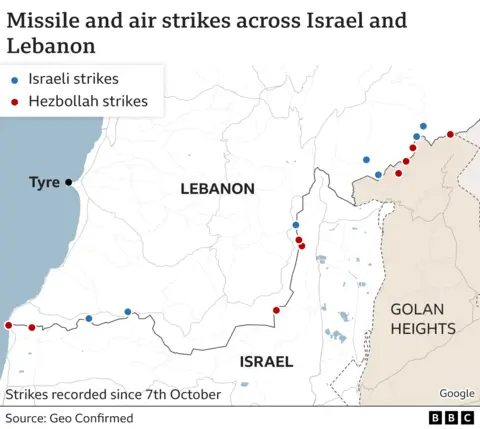Israel and Hezbollah: A New High
January 20, 2024 | Expert Insights

In a speech delivered on November 3rd, Hassan Nasrallah, the Secretary General of Hezbollah since 1992, delivered a dire warning to Israel, threatening to escalate the ongoing skirmish into a full-scale war.
Things have come to a dangerous point when, on January 2nd, in a surgical intelligence-based strike, Saleh al-Arouri was taken out in a southern Beirut suburb considered a Hezbollah stronghold. This was a significant loss to the Hamas command structure even though over 130 Hezbollah field commanders have allegedly been eliminated by Israel since October 7th. To aggravate the situation, apparently, two top Hezbollah commanders of Hezbollah have also fallen victim to Israel’s wrath. The first was Wissam Tawil, a senior head of Hezbollah's elite Radwan forces. The second strike eliminated Ali Hussein Burji, who led Hezbollah's aerial unit in southern Lebanon and was responsible for a drone strike on the headquarters of Israel's northern command in the city of Safed.
Background
Hezbollah is a Shia Islamist political party established in Lebanon in 1985. The group was initially set up with the key tactical support of the dreaded Islamic Revolutionary Guards Corps (IRGC) of Iran. It has always had close ideological and political connections with the Islamic Republic of Iran.
An organisation that pledges to destroy Israel, the Hezbollah has been a favourite proxy of Iran to inflict pain on Israel. However, on several occasions, Hezbollah has made it clear that it is no lackey of Teheran and is capable of independent actions.
For many years, Israel occupied the southern part of Lebanon as a buffer zone. When, in 2000, it withdrew in compliance with UN Security Council Resolution No 425, Hezbollah became the dominant force in this part of Lebanon. In fact, it is widely considered a force far superior to the national army of Lebanon, with a cadre strength of more than 25,000 full-time fighters and about 30,000 reservists (Jane 2017) with a military budget exceeding $ 800 million. It is no wonder that amongst all the paramilitary organisations on its periphery, Israel has a real security concern about this 'Party of Allah.' Some Israeli security experts have accepted that they had spent so much time, labour and resources in keeping a vigilant eye on Hezbollah up in the North that they missed picking up the signals of a Hamas intrusion in the South from the Gaza Strip.
In 2006, Israel again invaded Lebanon to punish the Hezbollah, causing widespread destruction in Southern Lebanon but failing to neutralise the Hezbollah. Since then, Hezbollah has only grown from strength to strength.
Hezbollah has played a key role in the Syrian Civil War, fighting on the side of the Bashar al-Assad regime as an Iranian proxy. Today, it is a part of the so-called "axis of resistance" against Israel along with Iran, Syria and Hamas. Hezbollah is also allied with other Iranian-backed forces in the region, like the Shia militias in Iraq and the Houthi forces in Yemen. Since October 7th, Hezbollah has kept Israel's northern borders active, forcing the evacuation of thousands of civilians from the region and denying the IDF to concentrate all its might on Gaza.

Analysis
Without claiming responsibility for the targeted killings inside Lebanon, the Israeli Defence minister issued a clear warning to all those who were involved in the October 7th massacre, irrespective of where they sought sanctuary, drawing attention to the retribution inflicted upon the perpetrators of the Munich massacre. That it can do so has been proved time and again by the Israeli state. Carrying out targeted killings is part of Israel's offensive defence strategy that has allowed it to survive as a nation-state despite being surrounded from all sides by hostile states ready to drive it into the sea. Over the years, the level of precision of such strikes has improved considerably, even if, at times, unintentional collateral damage occurs.
Neutralising a few key operatives has never stopped any militant organisation from remaining effective. Like the mythological Greek creature Hydra, such organisations grow ‘two more heads for every head decapitated.’ The act is more of a psychological weapon, putting dread of personal safety in the minds of its leaders, forcing them to go underground and lose contact with their cadre for effective command and control.
However, for a nation surrounded from all sides by a host of radical militant organisations with state support, these assassinations could have far bigger implications than the death of just two people. If Hezbollah feels significantly threatened, it could turn up the level of escalation in an unprecedented way. There are various ways in which this can happen and some in which Iran could be roped in. This would be Tel Aviv's (and, by association, the U.S.'s) biggest worry.
The northern part of Israel is not well defended. People there are left to fend for themselves. The level of Hezbollah rocket attacks here has increased in recent times. All of Israel’s military resources are currently focused mostly on the Gaza Strip. This fertile and well-populated area makes a valuable contribution to Israel's economy, which is now suffering from the threat of an imminent Hezbollah assault, which could dwarf the October 7th Hamas intrusion.
However, over the years, Hezbollah has shown itself to be a realist organisation with a strong sense of self-preservation. Defending its turf in its own country, as it successfully did in 2006, is a different ball game from going in for a conventional cross-border assault against a highly mobile modern army with immense firepower. It runs the risk of decimation, which no right-minded militant organisation would risk, however strong the provocation. So, while Hezbollah will not open a 'second front in the North,' its cadre will continue to stretch the Israeli border defences to its limit, inflicting painful casualties through well-calibrated 'hit and run' strikes on isolated military detachments, tanks on checkpoints and even armed settlers manning strong points. Of course, Hezbollah will continue to provide moral and indirect military support to Hamas.
However, escalation is still possible in other parts of the wider region. One such vulnerable country is Iraq. U.S. troops are still stationed there. Shia militias with Iranian support are trying to completely oust them from this country. The Houthis in Yemen have also declared their total allegiance to the Palestinian cause and stepped up their attacks on the shipping through the Red Sea.
Of course, the real control lies with Iran. Without a nod from Teheran, neither Hezbollah nor Hamas nor the Houthis or the Syria-based Shia organisations dare spiral the fighting to full-scale all-out war. It does not appear that, at this moment, Iran is spoiling for a fight that may give Israel and the U.S. an ideal cause celebre to inflict unacceptable damage to Iran's oil and economic infrastructure, including its nuclear installations. Iran is acutely aware that the U.S. considers Iran as the Enemy No. 1 in the Middle East, and any administration would be able to generate enough bipartisan support to take the war into Iran's economic guts.
However, Iran will continue to remain an important partner for Hezbollah. This is not a relationship between a patron and a subordinate. Rather, it could be said that this is a more or less equal relationship, with both sides gaining something out of it.
Assessment
- No doubt, the situation in the Middle East is graver than it has ever been since the invasion of Kuwait by Iraq. Other international entities besides the United States and the EU need to step onto the plate to prevent the Gaza War from spreading. The United Nations has to pull up its socks in this regard. The linkages for a regional conflagration are there. The only question is how this will play out.
- Israel’s assassination policy has not always been successful. Sometimes, it has had unintended effects. It increases the risk of starting a two-front war for a hard-pressed IDF, which it can ill afford, even with the U.S. at its side.
- Hamas and Hezbollah share a common enemy in Israel. The Gaza war opens a great opportunity for them to inflict the maximum damage on their hated enemy but not at the risk of their total extinction. As long as the Israeli military retains its ability to inflict unacceptable damage on all the countries on its periphery, none are likely to expand the war. If this was an option, they would not have waited for so long and allowed the death of so many Palestinians.








Comments